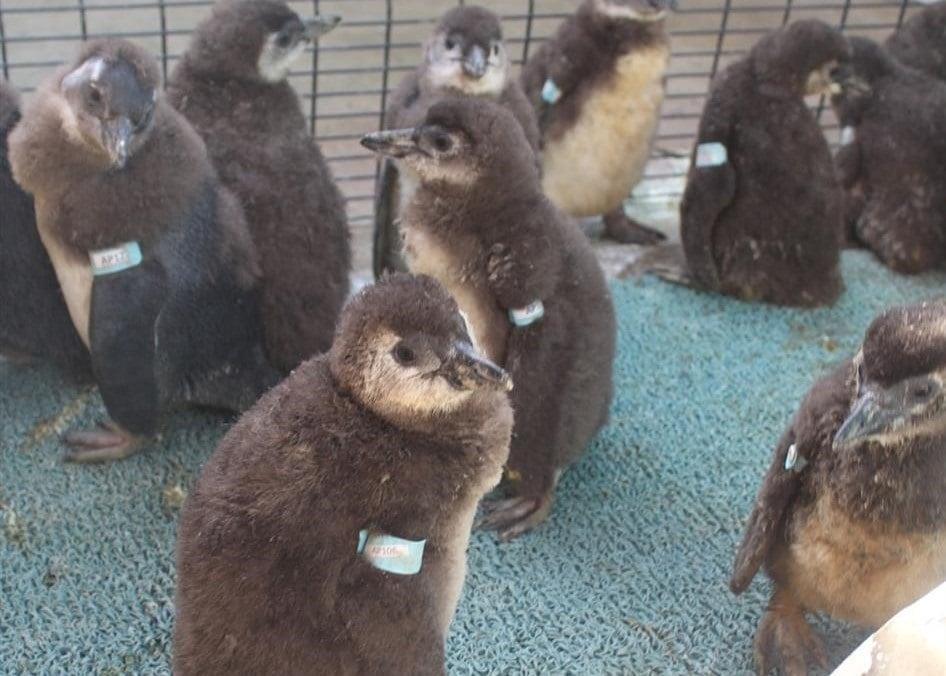Africa-Press – South-Africa. Two weeks after an emergency rescue operation to save 39 near-extinct African penguins off the coast of Nelson Mandela Bay, the Southern African Foundation for the Conservation of Coastal Birds (Sanccob) urged members of the public to assist in feeding and rehabilitating rescued chicks.
The abandoned chicks were found in extremely poor conditions on Bird Island, approximately 65km from the shore, in flooded nests, after recent heavy rainfall.
The penguins were rescued by Sanccob, in partnership with SANParks.
The organisation said it was in desperate need of fish (sardines), to feed the African penguin chicks, as well as veterinary supplies, rehabilitation consumables and additional donations of towels and linen.
According to Sanccob’s marketing and fundraising coordinator, Kirstie Paulse, a few of the tiny birds were found in or near their nests, which were either underwater or completely destroyed.
She said the chicks could not be reunited with their parents and had to be placed in transport boxes, which were specifically designed for them.
The boxes were sent to Sanccob’s rehab centre on a SANParks boat.
“A full medical examination was conducted on all the chicks during their admission by Sanccob’s veterinary and rehabilitation staff and they were subsequently separated into different areas, depending on the treatment needed for each chick,” Paulse said.
“The chicks rescued from the island varied in size, with the smallest one weighing only 1.59g on arrival, and the largest weighing 1.8kg. They are likely to remain in care for an average of 60 to 90 days before they will be released.”
Paulse added that the long period of rehabilitation was exactly why the centre depended on help from the public.
Nelson Mandela Bay’s St Croix Island, which is about 25km offshore, used to be home to the largest African penguin colony in the world – but, in recent times, the population had declined by approximately 80%.
A conservationist at Raggy Charters Marine Eco-Cruises, Lloyd Edwards, said that, 25 years ago, the island had approximately 60 000 penguins. About seven years ago, the numbers had declined to around 20 000.
Edwards explained that this was largely due to ship-to-ship bunkering, where ships refuel at sea, instead of heading to the harbour to do so. This led to fuel spilling in the water, endangering the penguins.
Another reason was overfishing. Due to a lack of fish in their immediate vicinity, penguins had to swim far and dive deeper to get food. By the time they get back, there would be nothing left in their bodies to regurgitate and feed their chicks, so most of them would die.
Fishing in the area had since been prohibited – and the island and surrounds declared marine protected areas.
“Rescues like these are thus vital for the species’ survival and every bird that we successfully rehabilitate and release back into the wild is another bird that can contribute to the breeding population of this endangered species,” said Carl Havemann, Sanccob’s centre manager.
He said the organisation took pride in its preparedness and its response to mobilise human resources and equipment for rescue operations, but was still completely reliant on donor funding and volunteer support.
“It costs an estimated R10 000 each to hand-rear a chick from admission to the stage that it can be released. Sanccob is appealing to members of the public and businesses at large for an emergency contribution toward these costs.
“We also need local volunteers to assist with tasks in the seabird rehabilitation department. These may include, but not limited to, food preparation, bird handling, driving and administrative support,” Paulse said.
Anyone interested in contributing toward the Gqeberha Chick Campaign can email [email protected].
Donations can be dropped off at the centre, which is located on Marine Drive in the Cape Recife Nature Reserve.
For More News And Analysis About South-Africa Follow Africa-Press






